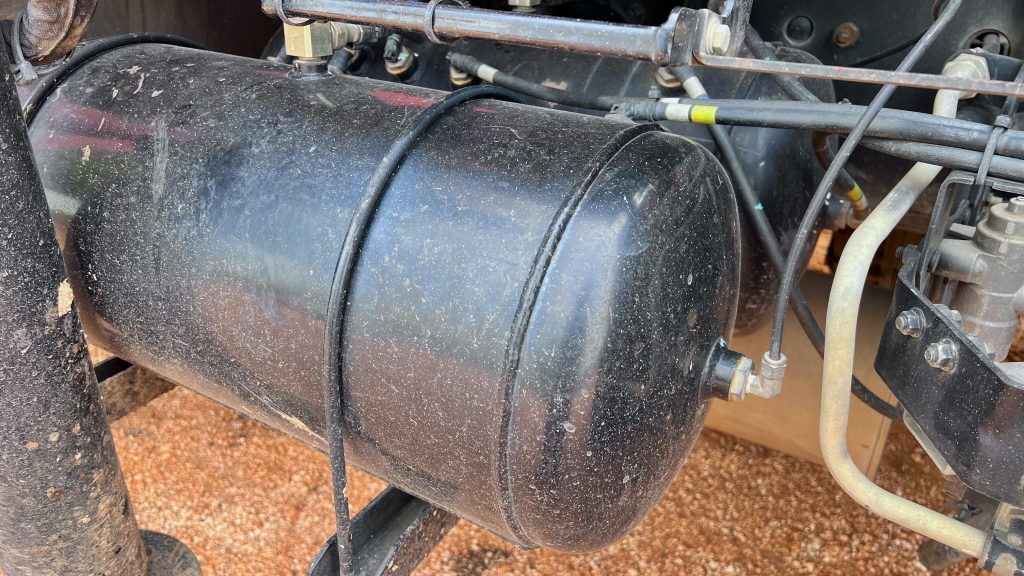
When the weather gets cold, certain systems on diesel trucks are prone to problems. One common issue is frozen brake lines. This occurs because the air brake systems on all commercial trucks can accumulate moisture if they are not properly maintained. Frozen brake lines can result in unexpected downtime for your trucks and may require an emergency call to a mobile diesel mechanic experienced with diesel truck repairs. The cost of such emergency response diesel mechanics, the potential for costly repairs and the lost revenues makes frozen air brake systems exceedingly expensive.
Brake line anti-freeze, also known as air brake antifreeze, is a substance used primarily in commercial trucks and vehicles with air brake systems to prevent moisture from freezing in the brake lines during cold weather. While it can be beneficial in certain situations, it also comes with potential drawbacks. Here are the pros and cons of using brake line anti-freeze.
What are the Causes and Effects of Frozen Brake Systems:
Moisture accumulates in air brake systems when:
- Condensation forms inside air tanks and lines as compressed air cools
- Water vapor in the outside air is pulled into the system by the air compressor
- De-icing chemicals and road spray enter the system, mixing with water and oil vapor to form a watery sludge
When it gets cold, the moisture freezes, leading to frozen brake lines and tanks that block air from reaching the brake mechanisms. It could also lead to the air pressure being compromised, which will reduce the brake effectiveness. eezing in diesel trucks. However, when severely cold weather is in the forecast, or there is uncertainty about the function of the air dryer system, using “Brake Line Antifreeze” can reduce the possibility of air brake system failures.
Best Practices to Prevent Freezing:
By focusing on proper preventative maintenance, most frozen air system issues can be avoided. Proper preventative steps every fleet manager and driver should be taking include:
- Drain Tanks and Traps: Regularly draining air tanks and water traps helps remove accumulated moisture before it becomes a problem.
- Regular Air Dryer Maintenance: Replace the air dryer’s desiccant cartridge annually to ensure it is functioning properly and removing moisture from the system. Don’t be cheap. Buy good quality cartridges.
- Regular System Inspection: Conduct thorough pre-trip inspections and address issues promptly to prevent many cold-weather brake problems.
Proper maintenance and moisture management are crucial for preventing air brake systems from freezing in diesel trucks. However, when severely cold weather is in the forecast, or there is uncertainty about the function of the air dryer system, using brake line antifreeze can reduce the possibility of air brake system failures.
Brake Line Anti-Freeze Has Several Benefits:
Using brake line anti-freeze with your diesel truck fleet offers a variety of benefits, including:
- Prevents Freezing: The primary advantage of using brake line anti-freeze is its ability to prevent moisture in the air brake system from freezing. Any time the temperatures drop below freezing, water in the brake lines can turn to ice. This could block air flow and cause brake failure. Anti-freeze helps mitigate this risk.
- Improves Cold Weather Performance: By preventing freezing, brake line anti-freeze helps maintain the overall performance of air brake systems in cold weather. For commercial trucks and vehicles that operate in harsh winter conditions, it can reduce the likelihood of weather-related brake malfunctions.
- Quick and Easy to Apply: Adding air brake antifreeze to an air ride system is quick and simple. It involves depressurizing the air tank, removing a fitting, and pouring a small amount of the antifreeze into the tank. This is easily done by either the driver or mechanic.
- Cost-Effective Short-Term Solution: Air brake anti-freeze is relatively cheap, costing only $8 to $10 per application.
Drawbacks of Brake Line Anti-Freeze:
There are also several potential drawbacks associated with using brake line anti-freeze:
- Potential Damage to Rubber Air Brake Components: The alcohol in the antifreeze can damage or eat through rubbers and plastics in the system and degrade seals in the system. When used excessively over a long period of time, this can lead to more serious issues and potentially costly repairs.
- Masks Underlying Issues: Using brake line anti-freeze can sometimes mask more serious underlying problems in the air brake system. Adding antifreeze doesn’t address the root cause, which could be a faulty air dryer or other component.
- Requires Regular Application: To be effective, airbrake antifreeze must be replenished regularly, especially in vehicles that are used frequently. Antifreeze is not a long-term solution. This ongoing maintenance requirement can be inconvenient and potentially costly over time.
- Potential Health Concerns: Many brake line anti-freeze products contain methyl alcohol, which can be toxic. This raises potential health and environmental concerns, particularly if the substance leaks or is improperly disposed of.
Proper Maintenance and Regular Inspections Can Reduces the Need for Brake Line Anti-Freeze:
While brake line anti-freeze can be useful in certain situations, particularly for short-term protection against freezing in air brake systems, it’s not without its drawbacks. Its use can damage some components or mask other problems.
By focusing on proper maintenance, regular inspections, and ensuring the air dryer system is functioning correctly, most air brake systems will not need brake anti-freeze.
In an air brake system freeze, it will need to be thoroughly checked by a certified diesel mechanic with truck repair experience. Many parts and components can be damaged and fail after being frozen,
If you have questions or need emergency response services to repair semi-trucks, trailers, and fleet vehicles, Mobile Wrench has certified mobile diesel mechanics to help get you back on the road. Contact us today to schedule an appointment.
